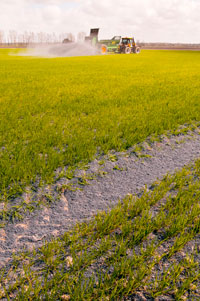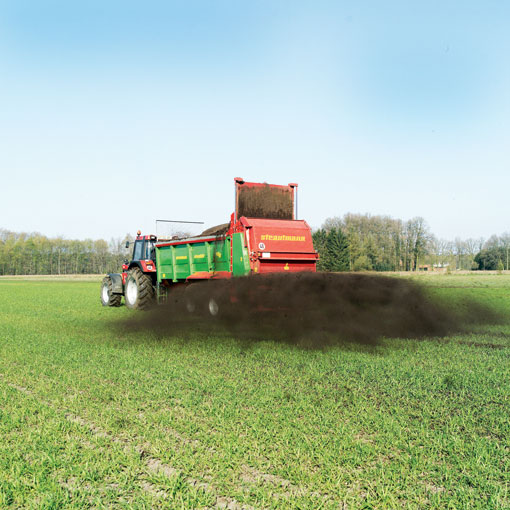Digesting biosolid pricing

There is little doubt that spreading recycled sewage sludge on farmland is good for the soil. It provides high levels of phosphate, some nitrogen and does wonders for soil structure.
But since water companies began charging £2-£11/t for the service, some farmers have questioned its value.
So why are water companies invoicing growers for a product they have to recycle anyway, and why does the price fluctuate between regions?
Improved product quality and investment in high-tech sewage treatment works appear to be the main drivers. But proximity to treatment works, artificial phosphate price and customer loyalty are key considerations for some providers. Quality of service when delivering and spreading service can also vary between operators.
Yorkshire Water has a three-tier charging system for biosolids, says the utility firm’s Graeme Strickland. “Long-term customers who are close to our sewage works continue to receive biosolids free of charge, but they are responsible for spreading it.”
Newer customers are charged, but the fee does include delivery and spreading. Distance from the site and the amount of competition from other wastes govern the price.
The firm began charging after investing in an anaerobic digestion plant which de-watered the product and blended it with wood waste or composted green waste.
“It is a much more stable product, with more consistent nutrient content and it doesn’t leach,” says Mr Strickland. “I can’t give specific prices as they are commercially sensitive, but they are much lower than the true fertiliser value of the product.”
The product is priced to keep farmers on side, by sitting below the true nutrient value, but helps contribute to the firms recycling costs, he says.
“We want a consistent land bank and wouldn’t want to price ourselves out of the market. We charge farmers a fair price and find in return they are very helpful when we need to deliver the product at inconvenient times.”
 |
|---|
| The price of sewage sludge can differ from region to region. |
The third tier is a granulated product, which is significantly more expensive, but it has a high nutrient content and is dust-free, says Mr Stickland.
Anglian Water says average total phosphate content in an application of its Nutri-bio product is 260kg/ha P2O5, says the biosolids sales manager Alan Thorogood. “But total phosphate content can vary between streams/lines of production across the region from 155-450kg/ha per application,” he adds. “Application rate is determined by nitrogen content and ranges from 17-25t/ha for cake products.”
The firm has invested £150m in nutri-bio production at its Kings Lynn, Norwich, Milton Keynes, Cambridge, Tilbury and Northampton facilities, which means product quality is constantly improving. “There is a greater proportion of digested and granular products compared with limed products – both store well and in some cases they are practically odourless.”
The digested product, Nutri-bio, contains significant quantities of phosphate, nitrogen, magnesium and sulphur, he says. “Potassium is also present, but at very low levels.”
Prices vary from £3.50/t to £11.00/t for Nutri-bio and £25-£50/t for granules. “The two key factors that affect price are phosphate content and haulage, so the price can fluctuate,” says Mr Thorogood. “Fuel is a major cost for us on the haulage, movement of plant and equipment and operating our nine Terragators during the spreading campaign.” But prices also mirror the artificial phosphate market and the quantity of nitrogen available to the crop, he notes.
Southern Water produces around 100,000t treated digested cake and over 25,000t enhanced treated granules, says Simon Spence from their contractor Viridor. “Enhanced granules can be spread on grass as well as arable ground as they don’t need to be incorporated.”
Prices of the granulated product can vary according to the straight phosphate market, but digested cake has fixed seasonal pricing.
“In the summer digested cake costs £3/t spread and the spring rate is £2.50/t,” he says. “Enhanced Granules are currently £25/t, delivered and spread.”
There is no additional transport charge, but they do have a defined spreading radius, he adds.
Thames Water has a seasonal price variation, but the area of land treated and the nutrient value are taken into consideration, says spokesman Simon Evans. “Land availability, volume and income also have to be balanced when we are reviewing requirements with our customers. The income from biosolids sales contributes to our recycling operation, although it does not cover all the costs.”
But Scottish growers are still not being charged for taking the product as Scottish Water has not been privatised, says Scottish Water spokesman Chris Hodge.
Scottish Water recycled around 91,000t of digested cake and lime pasteurised cake last year.
Farmer views on biosolids
Farmers Weekly Barometer Farmer Peter Sands, who farms at Brewood, Staffordshire takes 10,000t of biosolids a year from Severn Trent Water. Until last year the product was delivered and spread for free, but now he is paying £2/t.
“It provides enough phosphate for three years’ cropping, but the nitrogen benefit is much lower,” he says. “It also helps build up soil organic matter, but it’s hard to work out the true value of this.”
His agronomist Bryce Rham reckons the price is worth paying, but if it continues to increase, the product will eventually become financially unviable, he says. “At the moment the value of fertiliser saved and the building up of organic matter does compensate for the price of the product.”
But there are other sources of organic manure growers can use should the price of biosolids become prohibitive, he notes.
Green waste compost is one option and is free in some areas.
“Products vary, but in general compost has a slightly lower nutritional value than biosolids – both improve soil structure,” he says.
High transport costs can be the downfall. “If you are within two miles of a compost site it will probably be worthwhile.”
Eastern Barometer farmer Edd Banks who farms at Harlton, Cambridgeshire has also started paying for biosolids recently. “First it went up to £1.50/t, but now we’re paying £3/t.”
Nutrients provided by the product are beneficial, particularly when prices of artificial fertiliser are high, but cultivations can be delayed by product spreading, he says.
“In the first two years, we get good levels of phosphate, but we don’t count the third year.”
Nitrogen input is minimal, but he does reduce his first nitrogen application to 20kg/ha ammonium nitrate.
He has a contract for 3000t of product per year, but took 6500t last season. “I wouldn’t like to see the price get any higher, but we do get on well with it.”
Norfolk farmers spread paper soil improver
Spreading recycled paper on farmland is helping farmers in East Norfolk improve soil structure, water and nutrient retention, without locking up nitrogen.
Paper crumble from a recycling plant at Kings Lynn is being applied at rates of up to 50t/ha as a cost effective way of boosting organic matter and improving soil structure.
In the past, some growers have been worried about applying paper crumble, fearing it locks up nitrogen in much the same way as chopped straw. But the inclusion of biological material in the mix looks to have overcome the problem.
On lighter land, it improves water and nutrient retention and on heavier soils it improves workability, says Farmacy agronomist Ed Stevens. “It’s a useful product because it can be spread easily and unlike some other bioproducts there is no need to incorporate or inject into the soil. It’s also very low in potential toxic elements.”
The crumble’s low carbon to nitrogen ratio means there is no nitrogen lock-up when used at current rates, he says.
| Water Company | Product Type | Price |
| Anglian Water | Nutri-bio cake | £3.50-11.00/t |
|
| Granules | £25-£50/t |
| Southern Water | Biosolids cake | £2.50-£3/t |
| Severn Trent | Biosolids cake | £2.50/t average |
| Thames Water | Biosolids cake | Unavailable |
| Yorkshire Water | Biosolids cake | Unavailable |
|
| Granules | Unavailable |
| Northumbrian Water Biosolids cake | Unavailable, but higher at peak times |
|
The revised RB209 Fertiliser Manual has been published and, for the first time, includes nutrient management information for compost and digested sewage products. The manual can be downloaded at www.defra.gov.uk/rb209. Hard copies are available from The Stationary Office online bookshop or by calling 0870 2430123.

